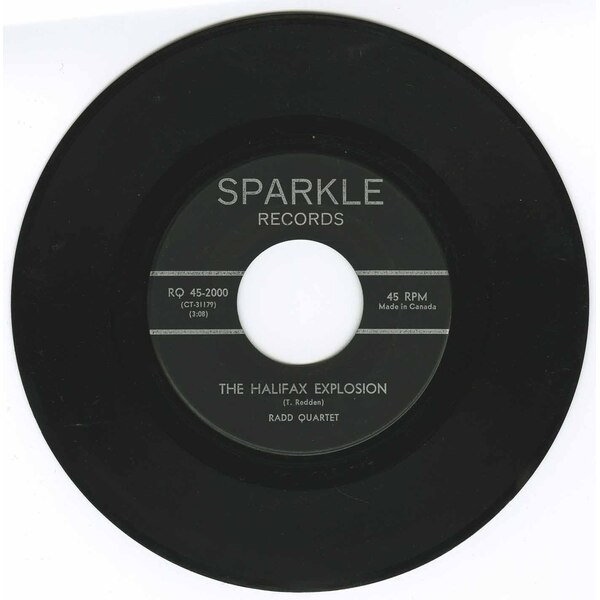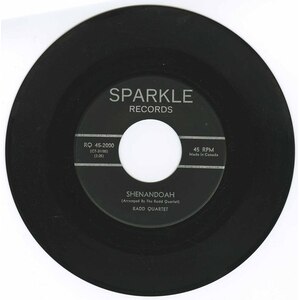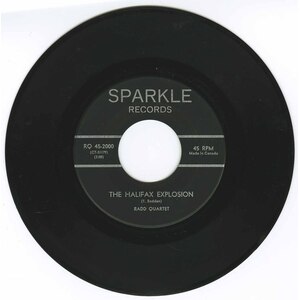Information/Write-up
The Radd Quartet was a Nova Scotia folk harmony group active from 1962 to 1964, formed in Halifax and comprised of Dennis Grant, Carol Isaac, Reed Myers, and Thayne “Bud” Redden. Drawing from Maritime folk traditions and the broader 1960s folk revival, the group became known for their warm four-part vocal arrangements and storytelling sensibility. They performed extensively throughout Eastern Canada and the Atlantic provinces, appearing at folk festivals, university events, exhibitions, private functions, and on regional television. Though their recorded output was limited, the group left behind a legacy of musical sincerity and regional authenticity.
In 1964, the Radd Quartet contributed the song “Lonesome Traveller” to the Dartmouth ‘Y’ Hootenanny compilation LP, issued by the Metro Audio Recording Company (Mar CT-31663). The album captured a vibrant moment in Nova Scotia’s folk scene and featured a wide range of young performers. The Radd Quartet’s appearance on the compilation stands as one of their only documented recordings alongside their rare Sparkle Records 45.
That same year, they released a rare 45 RPM single on Sparkle Records featuring the traditional ballad “Shenandoah” and an original composition by Thayne Redden titled “The Halifax Explosion.”
“The Halifax Explosion” was a powerful and deeply poignant folk ballad that tackled one of the darkest days in Canadian history. On the morning of December 6, 1917, in Halifax Harbour, the French munitions ship Mont-Blanc, loaded with high explosives bound for the front lines of World War I, collided with the Norwegian relief vessel Imo. The resulting blast was the largest man-made explosion prior to the atomic bomb, releasing energy equivalent to approximately 2.9 kilotons of TNT. A towering white-hot fireball vaporized everything near the blast zone, and a shockwave leveled much of the city’s north end.
The explosion killed nearly 2,000 people and injured over 9,000 others. Entire neighborhoods were flattened, a tsunami was triggered in the harbor, and debris rained down for miles. Among the casualties were civilians, dock workers, and members of the military. One of the ships anchored in the harbor, HMCS Niobe, was preparing to carry Canadian troops to Europe. Although the lyrics of Redden’s song refer to the Imo “taking troops to Normandy,” historical records confirm that the Imo was in fact a Belgian relief ship carrying humanitarian supplies, and the Normandy landings would not occur until nearly three decades later, in 1944. The explosion not only devastated Halifax physically, but it left an enduring emotional scar on the city and its people.
Thayne Redden’s ballad did what no official monument had done at the time: it captured the emotional truth of the tragedy in plainspoken lyrics and plaintive harmony. It offered a eulogy for the lost and a reminder of the human cost of war and miscommunication. In doing so, the Radd Quartet created one of the earliest and most affecting musical tributes to the Halifax Explosion—a song that remains virtually unique in the Canadian folk canon.
Carol Isaac, the group’s only female member, would go on to have a long and unpredictable musical journey. Born in Saskatchewan and raised in Nova Scotia as the daughter of an Air Force officer, Isaac traveled widely as a solo folk performer in her teens, crossing the country by train or hitchhiking to perform in coffeehouses. In the mid-1960s, she shared a stage in Fort William with Neil Young and his early band the Squires. Later, she settled in Winnipeg, where she formed the duo Bill & Carol with Bill Ivaniuk. The pair evolved into the folk-rock band Wild Rice, joined by Greg Leskiw—soon to be of The Guess Who—and released the 1972 LP Together. Wild Rice opened for major acts at the Centennial Concert Hall and toured through the American Midwest during the height of the Vietnam War. After leaving the professional music scene, Isaac focused on family life and returned to rural Manitoba, where she later performed with her children as Prairie Rose.
Although the Radd Quartet was short-lived, their contributions remain woven into the early 1960s Canadian folk tapestry. With their lone single, compilation appearance, and regional legacy, they captured a fleeting but vivid moment in Maritime musical history—one that endures through collectors, archivists, and the stories carried in their songs.
-Robert Williston
Dennis Grant: vocals
Carol Isaac: vocals
Reed Myers: vocals
Thayne (Bud) Redden: guitar, vocals
Written by Thayne Redden



No Comments